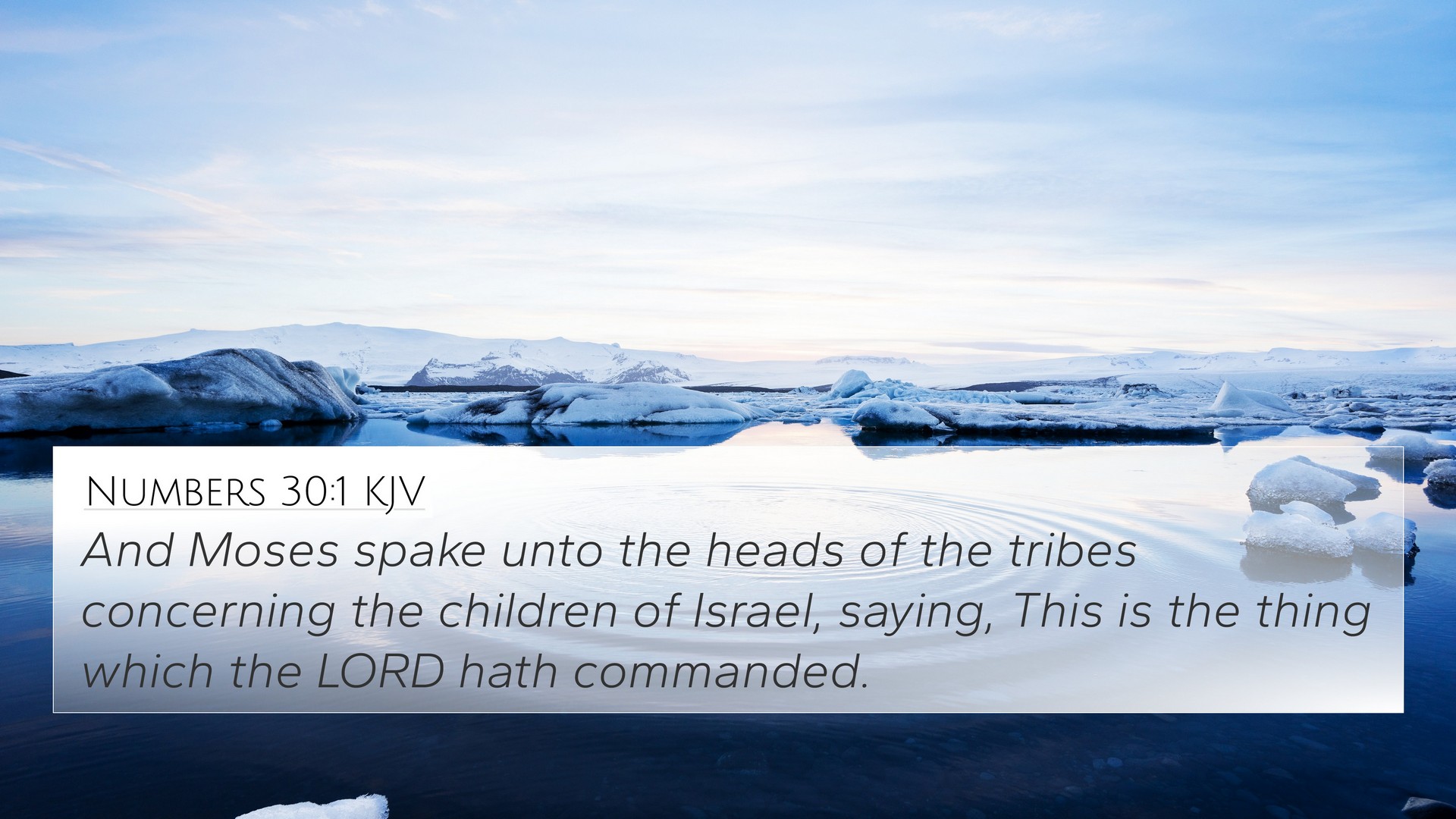Understanding Numbers 30:1
Numbers 30:1 presents important principles regarding vows and the authority of leaders in guiding their community in adherence to God's laws. Let us summarize its meaning using insights from various public domain commentaries, including those by Matthew Henry, Albert Barnes, and Adam Clarke.
Verse Overview
Numbers 30:1: "And Moses spake unto the heads of the tribes concerning the children of Israel, saying, This is the thing which the Lord hath commanded." This verse introduces a divine instruction from God through Moses to the leaders of Israel regarding vows.
Commentary Insights
-
Matthew Henry:
Henry highlights the significance of having the heads of the tribes present to hear God's command. This serves to ensure accountability and promotes unity in following the Lord’s statutes about vows.
-
Albert Barnes:
Barnes points out that the organization of the people under the leadership of Moses indicates a structured approach to obedience. The context centers on the necessity of being deliberate before making solemn commitments.
-
Adam Clarke:
Clarke explains the significance of vows in the Israelite community, emphasizing the serious nature of such promises to God. He elucidates that leaders must communicate clearly about the expectations regarding these commitments.
Thematic Connections and Cross-References
Numbers 30:1 reflects numerous themes and can be cross-referenced with various biblical texts. The following sections explore these connections.
Biblical Cross-References
- Leviticus 27:1-8: Discusses the regulations concerning vows made to God and their valuation.
- Deuteronomy 23:21-23: Advises on the importance of fulfilling vows made to the Lord.
- Psalm 76:11: Urges people to make vows to the Lord and perform them as a form of worship.
- Ecclesiastes 5:4-5: Warns about making rash vows and the responsibility of fulfilling them.
- James 5:12: Encourages integrity in speech, aligning with how one promises or vows.
- Matthew 5:37: Jesus teaches about commitments, urging honesty and clarity in what one promises.
- Romans 12:1: Calls for a living sacrifice as a form of commitment to God's will.
- 1 Thessalonians 5:24: Assures believers that God will ensure faithfulness in fulfilling that to which He has called them.
- Proverbs 20:25: Advises caution in making commitments, highlighting the potential consequences of a vow.
- Hebrews 6:16: Discusses the earnestness with which people commit to their oaths, reflecting divine assurance.
Practical Applications and Reflections
The clear communication of God's commands through leaders fosters a community spirit directed towards faithfulness. Understanding this verse can enhance one's spiritual maturity and commitment to God.
-
Importance of Accountability:
Leaders play a crucial role in guiding others in fulfilling their commitments. Engaging in community discussions about vows can strengthen relationships and encourage accountability.
-
Seriousness of Vows:
This verse serves as a reminder to approach vows with sincerity and thoughtfulness, elevating one’s promise's importance before God.
-
Understanding Commitment:
A deeper understanding of one's commitments to God and others is crucial, as these reflect one's faith and integrity.
Conclusion
Numbers 30:1 serves as a foundational verse regarding the nature of vows within the Israelite community, emphasizing the authority of leaders and the importance of fulfilling one's word. Utilizing tools for Bible cross-referencing can provide deeper insight into this and related scriptures, enhancing one’s experience in studying the Bible.
Keywords for Further Study
- Bible verse cross-references
- Connections between Bible verses
- Linking Bible scriptures
- Comparative Bible verse analysis
- Bible verses that relate to each other
- Cross-referencing Biblical texts
- Thematic Bible verse connections
- Bible verse parallels
- Scriptural cross-referencing
- Inter-Biblical dialogue







